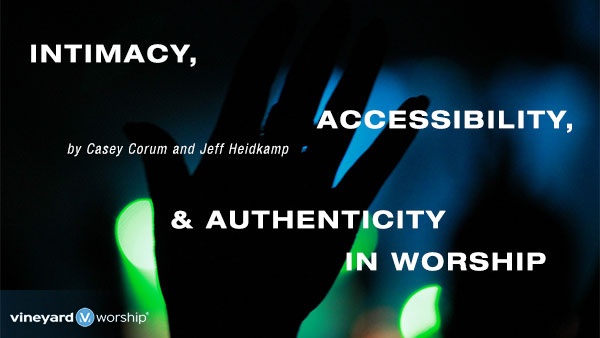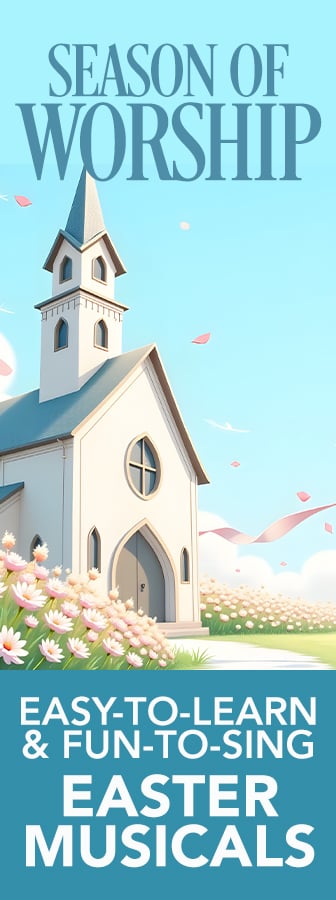
Jeff Heidkamp: Thinking in terms of the Vineyard community, which aspects of musical worship are especially important to you? What values are key to you as you lead that kind of worship?
Casey Corum: One keyword I think is still relevant is intimacy. The Vineyard has also used accessibility and authenticity. I borrowed these liberally from Brian Doerksen years ago. I still think it was a good idea.
INTIMACY
CC: It’s good to unpack the word “intimacy.” Yes, we should be singing to God, not just about him…but it goes deeper than that, into the heart of where it’s all coming from. The expectancy and faith that God is on the other end of the line. At times we can lose that sense of expectancy, which can play out in our practice.
I’m of the belief that God can move in the moment, in a spontaneous way. I also believe that God can speak in advance and we follow that plan “by the book.” It’s easy to fall to one side of the ditch or the other. But we should always leave room for God to interact with us in the middle of a worship gathering.
Of course, that raises other issues: the timing of service, the quality of musicality, the song choice, and other things.
JH: You’re not saying that spontaneity is in itself a virtue — is that right? Just because something is spontaneous doesn’t make it better. But there is something about an openness to that spontaneity that speaks to some kind of faith and belief that there is a living God who can do whatever he wants.
CC: Right. And that experience becomes conversational. We don’t come into any conversation with a script. We respond to what the other person says back to us. If there’s a rote or going-through-the-motions piece of what we’re saying, maybe it’s not really a conversation. So when God wants to do or say something unexpected, there is a place for working that out.
All of this is a roundabout way to say that there can be clear communal moments with each other and with God in unexpected places. We call that “worship,” which is right. But if you go back to that place and try to do the same thing again, it may not work. Those moments can sometimes be “lightning in the bottle” moments.
JH: Here’s something I often think about ministry times and the worship service: To me, what truly makes it worship is admitting that sometimes it might be a little boring. That’s because we are actually depending on God to do something. But he’s free, and he won’t always exactly do it. In those times, I feel a little glad, because it means we’re not forcing anything. We’re not forcing emotion from people. It just means that God didn’t do exactly the thing we wanted this time. But it’s still good. It’s still worship.
ACCESSIBILITY
JH: You mentioned accessibility in worship as well. Could you talk about that?
CC: A major component of music is providing people with a “way in.” There are certain technical aspects to accessibility. If part of our goal is to allow people to sing corporately, there are technical things we need to take into consideration.
This goes a little deeper: We are not primarily gathered to have our own individualistic moments. The band is there as servants. The worship leader is there as a servant. All this can have technical and physical ramifications. It also has spiritual ramifications: urging people to come ready, come listening, come expectant…as I mentioned.
The musicians try to prepare other people to be faith-filled and expectant too. They work to set the stage. So you must consider some issues. What might you be doing that is leaving people out? Are there ways you are doing music that is creating barriers? How can you remove those barriers? Do you need to build a wheelchair ramp up the stairs? Do you need to diversify the language, or diversity the sound, or diversify the ethnic makeup of the team without lowering the hurdle?
JH: It strikes me that my own church has become diverse in age as the Vineyard becomes a multigenerational movement. We have to realize that “accessibility” will mean different things to different people. There will be compromises about volume and song choice and song style and language.
CC: Yes! And we should honor previous generations without leaving out the young ones. As our own movement ages, that gets more challenging.The more diverse the Vineyard gets, the more challenging it will be to find the common ground… to remove the barriers and let people in.
JH: It’s good to remember that it’s going to have to change over time. Otherwise the form or the value “hardens.” People start saying, “It has to sound like this.” Then you lose the idea of simply letting people in.
CC: When we think of the movement or the Vineyard church as a whole, it’s interesting, because there is a lot of musically broad diversity from church to church. Maybe one church is very gospel in style. One church is straight-up alternative rock. And one church has more of a country thing.
From a regional perspective, it makes sense. There are different parts of the country and different population groups. But we can go beyond marketing sensibilities and just let our artists be who they are. That leads us to more musical authenticity.
AUTHENTICITY
JH: That could be the trickiest part to define. Talk about what you’re thinking when you say authenticity.
CC: We talked about coming ready and honestly before God with an open heart. But there’s another piece. We’re allowed to be who we are. Even without thinking of the specific musician playing or singing at the time, there is something generally powerful about individual people expressing themselves. What they believe. What they think. What their voices sound like. What their fingers do on a particular instrument. There is something profound about people being who they are.
JH: That could go back to accessibility too, because the musician has a form of self-expression…but he’s got to live that out in a way where other people can join him to produce intimacy.
CC: Right. There is something to be said for that, especially as we try to tackle different styles or different moods. There is nothing more hollow and inauthentic than people trying to do something that’s just not “them.”
I believe people need to exercise the muscles they have without making every single thing push toward this multiethnic conversation. I think you can exercise certain muscles that maybe you don’t exercise as much. For me, maybe that is a blues-y gospel sort of edge. But, if I don’t have those muscles, or if they are more in a classical vein, I think there is something that communicates beyond style and beyond my personal preferences.
When I see somebody being herself and coming through powerfully and artistically, it’s beautiful. I can appreciate it. I’d rather see that than someone trying to do what she thinks she has to be for somebody else. We shouldn’t change our playlist or tweak to the point where we are potentially losing ourselves in the midst of it.
Considering the Questions
JH: When it comes to worship, everything changes all the time. Every time somebody plants a church in a place, it has a worship team, and those team members are trying to figure out what intimacy, accessibility, and authenticity looks like for their specific place. What might be some false starts, in your experience? And what are good steps to take as people try to embody these values in a new place? How should they navigate the new tensions?
CC: One thing that’s happened in recent years is the growth of a “top-40” church culture. It becomes easy to grab onto the latest record and try to duplicate it. For better or worse, even a church plant doesn’t have to do quite the heavy lifting, musically speaking, that people had to do years ago.
But maybe we should actually do some heavier lifting. Let’s not just take the popular song on the radio. Or maybe we take it, but we think about it a little bit. Let’s exercise our creative muscles, consider who is coming into our church, and pray about it. You can do songs that are on the radio that are going to work, since people generally know them already (depending on their cultural choices).
But consider this: Are those songs saying something that you want to say to God? That’s a basic question that I ask when I am going to introduce a new song. After that, think about who you have on your music team, think about who your congregation is, and don’t be content to take a song at its face value.
There will be some wrestling with all of that. People who are not the most skilled musicians will counter, “I can’t just reinvent something.” But you probably shouldn’t be just another cover band anyway. It’s easy to be good at that. It takes a lot more intention not to do that.
The questions people ask when they begin a church plant are the same questions they should ask themselves over time: “Are we making things accessible to others? Are some things we’re doing getting in the way? Are we being authentic before God? Are we actually being ourselves? Are we allowing those expressions to come through? Are we engaged? Are we leaving room for God to break in? Do we actually believe that God is listening? Do we believe the things we are singing?”
* * *
This article was originally published in Cutting Edge Magazine Vol.15 no.10: Worthship. Used by permission. To read the full version of the interview, go to http://www.vineyardworship.com/blog/view/Our+Key+Values+in+Worship/7










